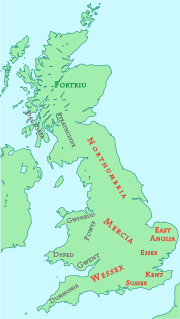Related Research Articles

The Kingdom of the South Saxons, today referred to as the Kingdom of Sussex, was one of the seven traditional kingdoms of the Heptarchy of Anglo-Saxon England. On the south coast of the island of Great Britain, it was originally a sixth-century Saxon colony and later an independent kingdom. The kingdom remains one of the least known of the Anglo-Saxon polities, with no surviving king-list, several local rulers and less centralisation than other Anglo Saxon kingdoms. The South Saxons were ruled by the kings of Sussex until the country was annexed by Wessex, probably in 827, in the aftermath of the Battle of Ellendun.

Æthelbald was the King of Mercia, in what is now the English Midlands from 716 until he was killed in 757. Æthelbald was the son of Alweo and thus a grandson of King Eowa. Æthelbald came to the throne after the death of his cousin, King Ceolred, who had driven him into exile. During his long reign, Mercia became the dominant kingdom of the Anglo-Saxons, and recovered the position of pre-eminence it had enjoyed during the strong reigns of Mercian kings Penda and Wulfhere between about 628 and 675.
Berhtwald was the ninth Archbishop of Canterbury in England. Documentary evidence names Berhtwald as abbot at Reculver before his election as archbishop. Berhtwald begins the first continuous series of native-born Archbishops of Canterbury, although there had been previous Anglo-Saxon archbishops, they had not succeeded each other until Berhtwald's reign.
Jænberht was a medieval monk, and later the abbot, of St Augustine's Abbey, Canterbury who was named Archbishop of Canterbury in 765. As archbishop, he had a difficult relationship with King Offa of Mercia, who at one point confiscated lands from the archbishopric. By 787, some of the bishoprics under Canterbury's supervision were transferred to the control of the newly created Archbishopric of Lichfield, although it is not clear if Jænberht ever recognised its legitimacy. Besides the issue with Lichfield, Jænberht also presided over church councils in England. He died in 792 and was considered a saint after his death.
Eadberht of Selsey was an abbot of Selsey Abbey, later promoted to become the first Bishop of Selsey. He was consecrated sometime between 709 and 716, and died between 716 and 731. Wilfrid has occasionally been regarded as a previous bishop of the South Saxons, but this is an insertion of his name into the episcopal lists by later medieval writers, and Wilfrid was not considered the bishop during his lifetime or Bede's.
Eolla, Bishop of Selsey, was the successor of Eadberht, and seems to have previously been Abbot of Selsey, as he witnessed a charter of Noðhelm together with Osric and Eadberht. He seems to have succeeded as bishop in either 716 or 717. His date of death is sometime between 716 and 731.
Oswald was a medieval Bishop of Selsey, often called Osa for short.
Gislhere was an English Bishop of Selsey in the eighth century.
Tota was a Bishop of Selsey when Sussex was being ruled by Offa of Mercia.
Æthelwulf was an Anglo-Saxon Bishop of Selsey.
Cynered, was a Bishop of Selsey.
Guthheard was a medieval Bishop of Selsey.
Wighelm is a probable Bishop of Selsey.
Beornheah was a Bishop of Selsey.
Wulfhun was a Bishop of Selsey.
Ælfred or Alfred was an Anglo-Saxon Bishop of Selsey. Ælfred attests charters from 943 to 953. In 945 he received a grant of land from Edmund I. Ælfred died between 953 and 956.
Eadhelm was a medieval Bishop of Selsey.
Ælfmær was an Anglo-Saxon Bishop of Selsey.
Æthelric I was an Anglo-Saxon Bishop of Selsey.

The Bishop of Chichester is the ordinary of the Church of England Diocese of Chichester in the Province of Canterbury. The diocese covers the counties of East and West Sussex. The see is based in the City of Chichester where the bishop's seat is located at the Cathedral Church of the Holy Trinity. On 3 May 2012 the appointment was announced of Martin Warner, Bishop of Whitby, as the next Bishop of Chichester. His enthronement took place on 25 November 2012 in Chichester Cathedral.
References
- Fryde, E. B.; Greenway, D. E.; Porter, S.; Roy, I. (1996). Handbook of British Chronology (Third revised ed.). Cambridge, UK: Cambridge University Press. ISBN 0-521-56350-X.
- Kelly, S. E. (1998). Charters of Selsey. Anglo-Saxon Charters 6.